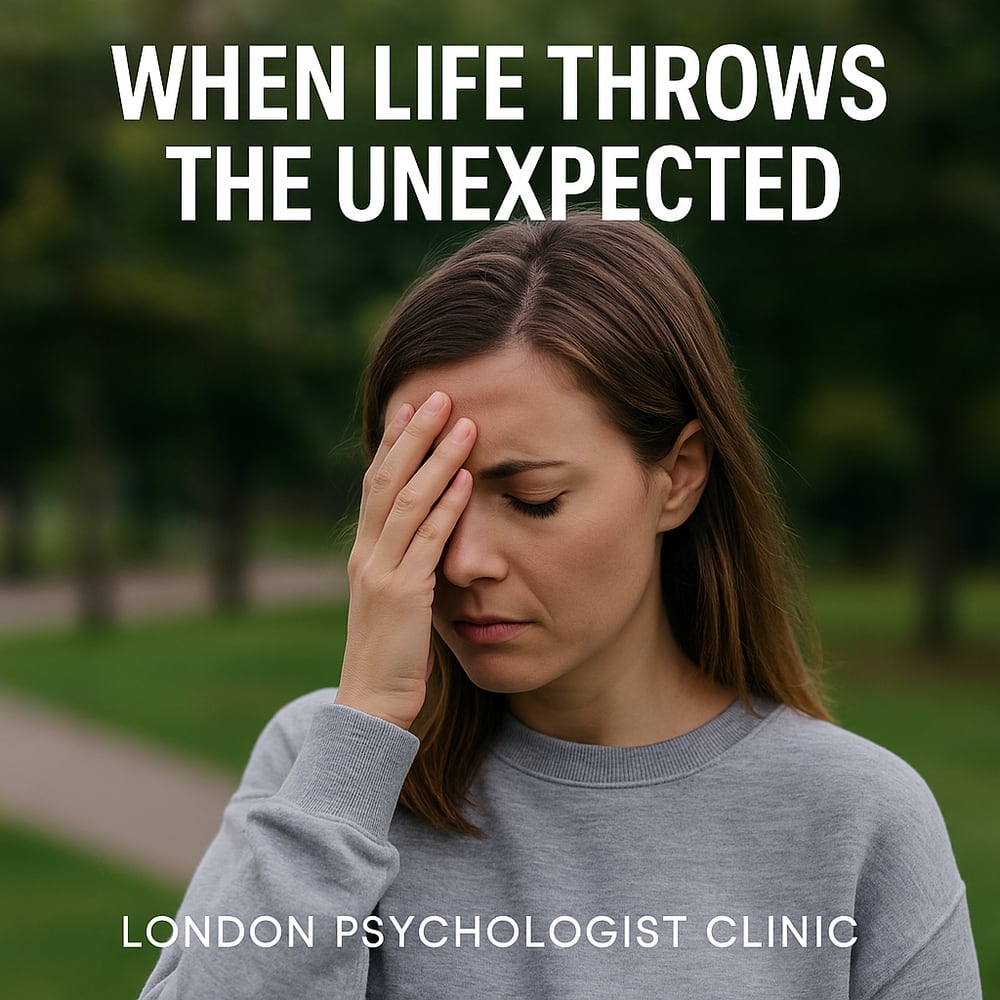When Life Throws the Unexpected

posted 4th August 2025

When Life Throws the Unexpected: Coping with Sudden Challenges and Building Psychological Resilience
Unexpected life events — whether a sudden illness, relationship breakdown, bereavement, job loss, or financial difficulty — can disrupt our emotional equilibrium and leave us feeling overwhelmed or paralysed. For many, it’s not just the major events that create psychological strain, but the accumulation of everyday stresses that erode our capacity to cope. At the London Psychologist Clinic, we often support individuals who find that life’s curveballs feel unmanageable, not due to weakness, but because their internal resources have quietly been depleted over time.
Why Do Unexpected Events Hit So Hard?
Psychologically, we all operate with a finite stress threshold. When that threshold is already taxed — by poor sleep, anxiety, or unresolved trauma — even relatively minor disruptions can feel catastrophic. This is especially true for those who experience Generalised Anxiety Disorder (GAD), depression, or high-functioning distress. When small stressors begin to send us to bed, figuratively or literally, we are less equipped to face life’s inevitable bigger challenges.
One pivotal study from the British Journal of Psychiatry (Kendler et al., 2003) demonstrated how stressful life events are strong predictors of depressive episodes, particularly in individuals with limited coping mechanisms or pre-existing vulnerabilities. This is not a reflection of personal failure — but of the importance of proactively developing psychological resilience.
How a Psychologist Can Help You Rebuild Your Coping System
Seeking help early is not a sign of weakness — it is a sign of foresight. Clinical psychologists are trained to detect the underlying thought patterns, behaviours, and emotional vulnerabilities that may compromise your ability to adapt to stress. Through psychological formulation, we work to understand the root of your distress, not just the symptoms.
Psychologists can help you:
- Understand how your thinking style affects how you respond to stress
- Recognise unhelpful patterns such as catastrophising, all-or-nothing thinking, or avoidance
- Build healthier coping strategies to manage uncertainty, grief, or fear
Cognitive Behavioural Therapy (CBT): A Tool for Life's Challenges
CBT is one of the most effective, evidence-based interventions for stress, anxiety, and depression — and it’s particularly effective in helping individuals navigate periods of upheaval. CBT focuses on the relationship between thoughts, emotions, and behaviours.
For example:
If you think: “I’ll never recover from this,”
You may feel: hopeless, anxious
And act: by withdrawing, ruminating, or avoiding necessary decisions
CBT helps interrupt this cycle by challenging unhelpful thoughts, encouraging behavioural activation, and developing problem-solving skills. It doesn’t remove life’s challenges, but it empowers individuals to respond with clarity and agency, rather than fear or paralysis.
The Power of Early Intervention
Many clients express regret about not seeking help sooner. As one client put it:
“I kept thinking I could cope, until something small tipped me over. I wish I’d come before the big thing hit.”
When your coping system is already under strain, waiting for a crisis can be risky. As psychologists, we often say — if the small stuff is already sending you to bed, wait until the big stuff comes along. Getting help now is not just about managing today’s stress; it’s about building a stronger foundation for whatever life brings tomorrow.
Resilience is Built, Not Born
At the London Psychologist Clinic, we understand that life is unpredictable. We also know that mental resilience is not a fixed trait — it is something that can be nurtured, restored, and reinforced with the right psychological support.
If you’ve found yourself struggling to cope, even with “ordinary” life events, it may be time to reflect on your psychological wellbeing. You don’t have to wait for a crisis to seek support. Through expert formulation and evidence-based therapies such as CBT, we can help you regain clarity, confidence, and control — whatever life throws your way.



